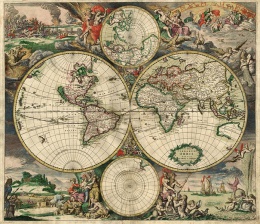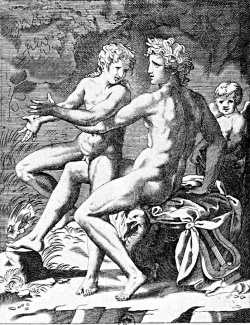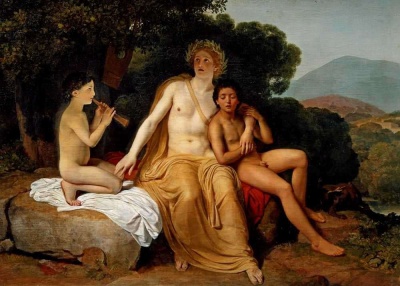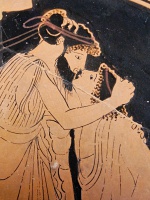Apollo (mythology)
| Part of the boylove history series |
 |
| Portal:History |
Apollo (Attic, Ionic, and Homeric Greek: Ἀπόλλων, Apollōn (GEN Ἀπόλλωνος); Doric: Ἀπέλλων, Apellōn; Arcadocypriot: Ἀπείλων, Apeilōn; Aeolic: Ἄπλουν, Aploun; Latin: Apollō) is one of the most important and complex of the Olympian deities in classical Greek and Roman religion and mythology. [1]
Apollo is the son of Zeus and Leto. His twin sister is Artemis. He is the god of music, playing a golden lyre. The Archer, far shooting with a silver bow. The god of healing. The god of light. The god of truth, who can not speak a lie. Apollo was also known as a teacher or mentor of mankind, teaching music, poetry, archery, healing, justice, and prophesy. Apollo, as the god of music, gave the boy Orpheus (a legendary musician, poet, and prophet. aka the first Thracian pederast) a golden lyre and taught him to play it.[2] One of Apollo's more important daily tasks is to harness his chariot with four horses and drive the Sun across the sky. [3] He also took many lovers, both women and boys.
Male lovers

Hyacinth or Hyacinthus was one of Apollo's male lovers. He was a Spartan prince, beautiful and athletic. The pair was practicing throwing the discus when a discus thrown by Apollo was blown off course by the jealous Zephyrus and struck Hyacinthus in the head, killing him instantly. Apollo is said to be filled with grief: out of Hyacinthus' blood, Apollo created a flower named after him as a memorial to his death, and his tears stained the flower petals. The Festival of Hyacinthus was a Spartan celebration of his death and rebirth.
Cyparissus
In Greek and Roman mythology, Cyparissus or Kyparissos (Greek: Κυπάρισσος, "cypress") was a boy beloved by Apollo, or in some versions by other deities.[4] Cyparissus was the son of Telephus, whose father was Heracles and his story is set in Chios.
In the best-known version of the story, the favorite companion of Cyparissus was a tamed stag (a gift from Apollo), which he accidentally killed with his hunting javelin as it lay sleeping in the woods. Cyparissus asks Apollo to let his tears fall forever. Apollo turns the sad boy into a cypress tree, whose sap forms droplets like tears on the trunk, a classical symbol of mourning.
The myth is thus aetiological in explaining the relation of the tree to its cultural significance.[5] The stag as a gift from Apollo reflects the custom in archaic Greek society of the older male (erastēs) giving his beloved an animal, an act often alluded to in vase painting.[6] The myth of Cyparissus, like that of Hyacinthus, illuminates the social custom of pederasty in ancient Greece, with the boy, the beloved (eromenos) of Apollo metamorphosing from youth to a different state of existence (adulthood). Pederastic (boylove) myths often depict the process of initiation and transformation of the boy into adult male life,[7] with the allegorical "death" and transfiguration of the eromenos. The story of Cyparissus is mainly known from Hellenized Latin literature and frescoes from Pompeii.[8] No Greek cult devoted to Cyparissus has been identified.
Ovid, Metamorphoses 10. 106 ff (trans. Melville) (Roman epic C1st B.C. to C1st A.D.) :
"In all the throng the cone-shaped cypress stood; a tree now, it was changed from a dear youth loved by the god who strings the lyre and bow [i.e. Apollon]. For there was at one time, a mighty stag held sacred by those nymphs who haunt the fields Carthaean [i.e. on the island of Keos]. His great antlers spread so wide, they gave an ample shade to his own head. Those antlers shone with gold: from his smooth throat a necklace, studded with a wealth of gems, hung down to his strong shoulders--beautiful. A silver boss, fastened with little thongs, played on his forehead, worn there from his birth; and pendants from both ears, of gleaming pearls, adorned his hollow temples. Free of fear, and now no longer shy, frequenting homes of men he knew, he offered his soft neck even to strangers for their petting hands. But more than by all others, he was loved by you, O Cyparissus, fairest youth of all the lads of Cea. It was you who led the pet stag to fresh pasturage, and to the waters of the clearest spring. Sometimes you wove bright garlands for his horns, and sometimes, like a horseman on his back, now here now there, you guided his soft mouth with purple reins.

It was upon a summer day, at high noon when the [summertime constellation] Crab, of spreading claws, loving the sea-shore, almost burnt beneath the sun's hot burning rays; and the pet stag was then reclining on the grassy earth and, wearied of all action, found relief under the cool shade of the forest trees; that as he lay there Cyparissus pierced him with a javelin: and although it was quite accidental, when the shocked youth saw his loved stag dying from the cruel wound he could not bear it, and resolved on death. What did not Phoebus say to comfort him? He cautioned him to hold his grief in check, consistent with the cause. But still the lad lamented, and with groans implored the Gods that he might mourn forever. His life force exhausted by long weeping, now his limbs began to take a green tint, and his hair, which overhung his snow-white brow, turned up into a bristling crest; and he became a stiff tree with a slender top and pointed up to the starry heavens. And the God, groaning with sorrow, said; ‘You shall be mourned sincerely by me, surely as you mourn for others, and forever you shall stand in grief, where others grieve.’” [9]
Other young male lovers of Apollo
- Atymnius,[10] otherwise known as a beloved of Sarpedon
- Branchus (alternately, a son of Apollo)
- Carnus
- Clarus[11]
- Hippolytus of Sicyon (not the same as Hippolytus)[12]
- Iapis
- Phorbas (probably the son of Triopas)[13]
- Potnieus[14]
- Adonis was a Prince of Kypros (in the Eastern Meditteranean) who was loved by the god Apollon. Adonis was described as androgynous, acting like a man in his affections for Aphrodite, and like a woman with Apollon. [15]
- Hymenaios "Hesiod tells the story in the Great Eoiai . . . Magnes . . . lived in the region of Thessalia, in the land which men called after him Magnesia. He had a son of remarkable beauty, Hymenaios. And when Apollon saw the boy, he was seized with love for him, and would not leave the house of Magnes. [16] [17]
See also
References
- ↑ Apollo (Wikipedia)
- ↑ Orpheus (Wikipedia)
- ↑ Apollo (Greek mythology.com)
- ↑ Nonnus, Dionysiaca 11. 362 ff (trans. Rouse) (Greek epic C5th A.D.) : "A young Lakonian [i.e. Hyakinthos] shook Zephyros (the West Wind); but he died, and the amorous Wind found young Kyparissos (Cyparissus) a consolation for Amyklaian Hyakinthos (Amyclaean Hyacinthus)."
- ↑ Cyparissus (Wikipedia)
- ↑ Gifts of animals from the erastes are discussed as they appear in Attic vase-painting by Gundel Koch-Harnack, Knabenliebe und Tiergeschenke: Ihre Bedeutung im päderastischen Erziehungssystem Athens (Berlin 1983).
- ↑ Cyparissus (Wikipedia)
- ↑ Cedric G. Boulter and Julie L. Bentz, "Fifth-Century Attic Red Figure at Corinth," Hesperia 49.4 (October 1980), pp. 295-308. The authors present a possible identification of Cyparissus on a fragment of a Corinthian pot, No. 36, p. 306. The frescoes in the Pompeiian Fourth Style are discussed by Andreas Rumpf, "Kyparissos", Jahrbuch des Deutschen Archäologischen Instituts 63/64 (1948–49), pp. 83–90.
- ↑ KYPARISSOS
- ↑ Nonnus, Dionysiaca, 11. 258; 19. 181.
- ↑ Philostratus, Letters, 5. 3.
- ↑ Plutarch, Life of Numa, 4. 5.
- ↑ Plutarch, Life of Numa, 4. 5, cf. also Hyginus, Poetical Astronomy, 2. 14.
- ↑ Clement of Rome, Homilia, 5. 15.
- ↑ http://www.theoi.com/Olympios/ApollonLoves.html
- ↑ http://www.theoi.com/Olympios/ApollonLoves.html#Hyakinthos
- ↑ Antoninus Liberalis, Metamorphoses, 23.

